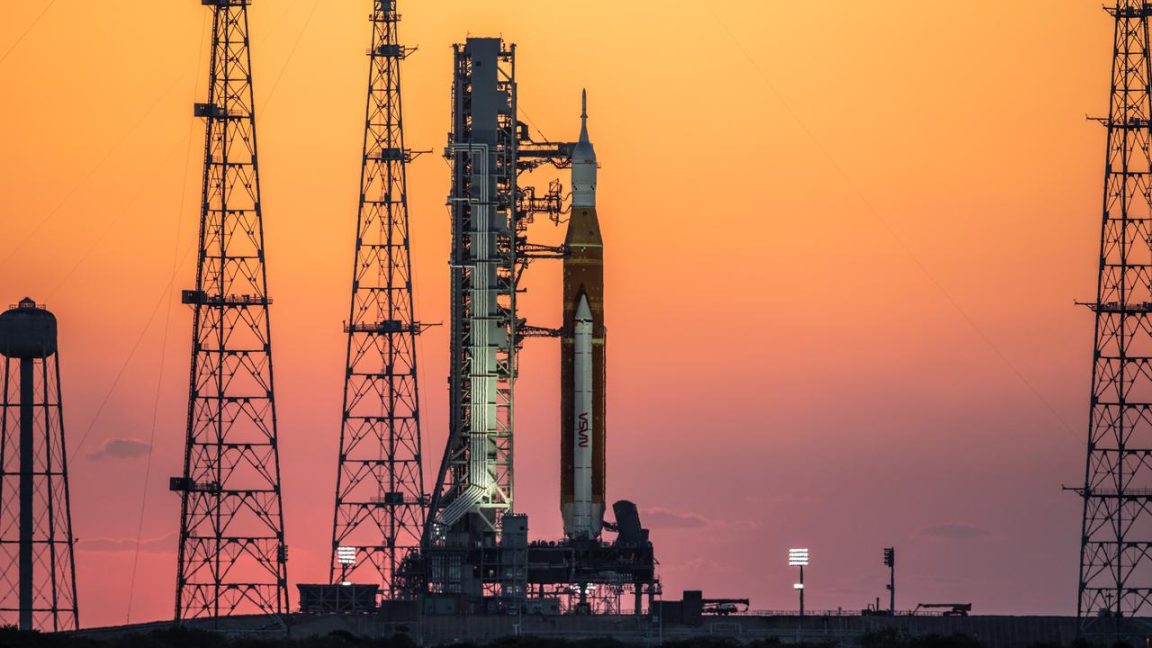
ARSTECHNICA.COM
How might NASA change under Trump? Heres what is being discussed
Speed and results How might NASA change under Trump? Heres what is being discussed "Elon get those rocket ships going because we want to reach Mars before the end of my term." Eric Berger Dec 23, 2024 10:09 am | 27 Could it be sunset for NASA's Space Launch System program? Credit: NASA Could it be sunset for NASA's Space Launch System program? Credit: NASA Story textSizeSmallStandardLargeWidth *StandardWideLinksStandardOrange* Subscribers only Learn moreAlthough the details remain in flux, the transition team reviewing NASA and its activities has begun to draft potential executive orders for changes to space policy under the Trump Administration.Sources familiar with the five people on the team, who have spent the last six weeks assessing the space agency and its exploration plans, were careful to note that such teams are advisory in nature. They do not formally set policy nor is their work always indicative of the direction an incoming presidential administration will move toward.Nevertheless, in trying to set clear goals for NASA and civil space policy, the ideas under consideration reflect the Trump administration's desire for "big changes" at NASA, both in terms of increasing the effectiveness and velocity of its programs.Not business as usualThe transition team has been grappling with an agency that has a superfluity of field centersten spread across the United States, as well as a formal headquarters in Washington, DCand large, slow-moving programs that cost a lot of money and have been slow to deliver results."This will not be business as usual," one person familiar with this group's meetings said. The mindset driving their deliberations is a focus on results and speed.Donald Trump will be inaugurated as president for his second term a little less than a month from now, on January 20. On that day he is expected to sign a number of executive orders on issues that he campaigned on. This could include space policy, but more likely that will wait until later in his presidency.One source said the space transition team has been working off of ideas that Trump has talked about publicly, including his interest in Mars. For example, during a campaign speech this fall, Trump referenced SpaceX founder Elon Musk, who played a significant role during the campaign both in terms of time and money, and his desire to settle Mars."We are leading in space over Russia and China... It's my plan, I'll talk to Elon," Trump said in September. "Elon get those rocket ships going because we want to reach Mars before the end of my term, and we want also to have great military protection in space."Ideas under considerationThe transition team has been discussing possible elements of an executive order or other policy directives. They include:Establishing the goal of sending humans to the Moon and Mars, by 2028Canceling the costly Space Launch System rocket and possibly the Orion spacecraftConsolidating Goddard Space Flight Center and Ames Research Center at Marshall Space Flight Center in AlabamaRetaining a small administration presence in Washington, DC, but otherwise moving headquarters to a field centerRapidly redesigning the Artemis lunar program to make it more efficient"Is any of this written in stone? No," a source told Ars.Additionally, substantive changes will need to be worked through the White House Office of Management and Budget, and negotiated with Congress, which funds NASA.Previously, Trump has announced that entrepreneur and commercial astronaut Jared Isaacman will be nominated to serve as NASA Administrator. Although he has been working to create a staff for his administration, Isaacman has not been involved in the transition team discussions, sources said. Rather, after he is confirmed, Isaacman is likely to be given authority to review major programs at the space agency "at the speed of light."Furthering commercializationIsaacman is expected to continue the direction of civil space as it existed under the first Trump administration. Then-administrator Jim Bridenstine pushed for the agency to more aggressively tap into the burgeoning US commercial space industry. NASA has supported the development of commercial space for two decades nowessentially paying for services at a fixed priceand it is seen as a key advantage over China and other international competitors in space.Although some critics have suggested that Isaacman will favor SpaceXhe has flown two private missions in the Crew Dragon spacecraft, and he has been very complimentary of the companyother sources have said that is not the case. They indicated that Isaacman believes the space agency needs help from a broad spectrum of companies to succeed.The push toward more privatization of spaceflight is likely because the commercial space industry is more established now than it was eight years ago, at the outset of Trump's first term. Additionally, in recognition of the increased importance of commercial space, state governments with NASA centers are also investing more money to attract space companies.For example, the state of Mississippi paid $21 million to construct a "Shared Services Center" at Stennis Space Center to make the facility more attractive for private companies to operate there. Space Florida is modernizing the Launch and Landing Facility at Kennedy Space Center for commercial activity. And more recently, the state of Texas appropriated $200 million in 2023 for the construction of an "Exploration Park" adjacent to Johnson Space Center, as well as $150 million more to a space commission.These state initiatives reflect a recognition that the future of spaceflight in the United States has moved on from the government-dominated Apollo and Space Shuttle eras and is likely to be led by a mix of government and commercial actors.Eric BergerSenior Space EditorEric BergerSenior Space Editor Eric Berger is the senior space editor at Ars Technica, covering everything from astronomy to private space to NASA policy, and author of two books: Liftoff, about the rise of SpaceX; and Reentry, on the development of the Falcon 9 rocket and Dragon. A certified meteorologist, Eric lives in Houston. 27 Comments
0 Commentarii
0 Distribuiri
121 Views


